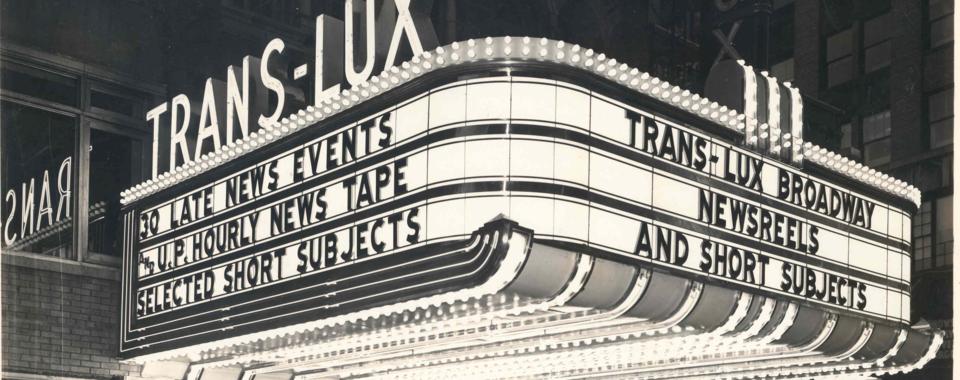
For movie audiences in the 1930s and 1940s, the newsreel was a window onto the world. Screened before the feature film, these 10-minute shorts produced by each of the Hollywood studios summarized the events of the day – from the historic to the trivial. In an era before television, the newsreel often defined how Americans and Canadians saw the world.
Featuring newsreels from archives across North America, this program includes several rarely seen films and some never-before-screened footage of Vancouver in the 1930s. Selected and introduced by newsreel historian, Joseph Clark, the films trace the history of news film before World War II and point to its social and political consequences. In the age of fake news, and the profound changes to journalism and documentary film brought on by the Internet, the history of the newsreel demonstrates how new technologies and media reshaped the public’s relationship with the world almost a century ago.
Join us for a live Q+A with Professor Zoë Druick in conversation with film scholar and programmer Joseph Clark discussing the films in this program and the launch of his new book News Parade: The American Newsreel and the World as Spectacle.
Fox Movietone News, Vol. XVIII, No. 11 (USA, 1935)
“Lindbergh in Paris,” Fox News (USA, 1927) / “Lindberh’s Triumph,” Kinograms (USA, 1927)
“Alexander Murdered,” Universal Newsreel (USA, 1934)
“Movie Comedians See the Big City,” Hearst Metrotone News (USA, 1932)
“Bombing of USS Panay,” Universal News Special (USA, 1937)
All-American News (USA, 1945)
Canadian Universal Newsreel (Canada/USA, 1942)
“Forest conservation in Vancouver—outtakes,” Fox Metrotone News (Canada/USA, 1935)
“Oarsmen limber up for 1934 season—outtakes,” Fox Metrotone News (Canada/USA, 1934)
Joseph Clark is a lecturer in film studies at Simon Fraser University. His research and teaching interests focus on archival and non-theatrical media, including newsreels, home movies, and sponsored film. He is a long-time member of the DOXA Documentary Film Festival Programming Committee and part of the organizing committee of the Vancouver Podcast Festival presented by DOXA.
Zoë Druick is Professor in the School of Communication at Simon Fraser University. Her primary areas of teaching and research are media studies, gender studies and cultural theory. Her research considers histories, theories and trajectories of documentary and reality-based media with an emphasis on their intersection with biopolitical projects. Her most recent books are The Grierson Effect: Tracing Documentary's International Movement and Cinephemera: Archives, Ephemeral Cinema and New Screen Histories in Canada.
For movie audiences in the 1930s and 1940s, the newsreel was a window onto the world. Screened before the feature film, these 10-minute shorts produced by each of the Hollywood studios summarized the events of the day – from the historic to the trivial. In an era before television, the newsreel often defined how Americans and Canadians saw the world.
Featuring newsreels from archives across North America, this program includes several rarely seen films and some never-before-screened footage of Vancouver in the 1930s. Selected and introduced by newsreel historian, Joseph Clark, the films trace the history of news film before World War II and point to its social and political consequences. In the age of fake news, and the profound changes to journalism and documentary film brought on by the Internet, the history of the newsreel demonstrates how new technologies and media reshaped the public’s relationship with the world almost a century ago.
Join us for a live Q+A with Professor Zoë Druick in conversation with film scholar and programmer Joseph Clark discussing the films in this program and the launch of his new book News Parade: The American Newsreel and the World as Spectacle.
Fox Movietone News, Vol. XVIII, No. 11 (USA, 1935)
“Lindbergh in Paris,” Fox News (USA, 1927) / “Lindberh’s Triumph,” Kinograms (USA, 1927)
“Alexander Murdered,” Universal Newsreel (USA, 1934)
“Movie Comedians See the Big City,” Hearst Metrotone News (USA, 1932)
“Bombing of USS Panay,” Universal News Special (USA, 1937)
All-American News (USA, 1945)
Canadian Universal Newsreel (Canada/USA, 1942)
“Forest conservation in Vancouver—outtakes,” Fox Metrotone News (Canada/USA, 1935)
“Oarsmen limber up for 1934 season—outtakes,” Fox Metrotone News (Canada/USA, 1934)
Joseph Clark is a lecturer in film studies at Simon Fraser University. His research and teaching interests focus on archival and non-theatrical media, including newsreels, home movies, and sponsored film. He is a long-time member of the DOXA Documentary Film Festival Programming Committee and part of the organizing committee of the Vancouver Podcast Festival presented by DOXA.
Zoë Druick is Professor in the School of Communication at Simon Fraser University. Her primary areas of teaching and research are media studies, gender studies and cultural theory. Her research considers histories, theories and trajectories of documentary and reality-based media with an emphasis on their intersection with biopolitical projects. Her most recent books are The Grierson Effect: Tracing Documentary's International Movement and Cinephemera: Archives, Ephemeral Cinema and New Screen Histories in Canada.